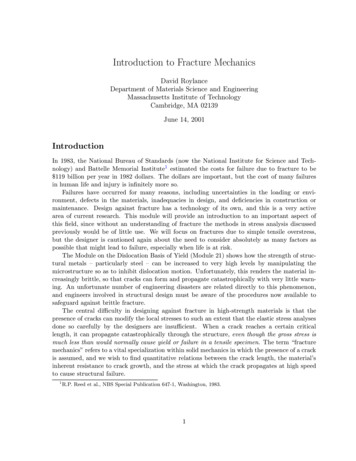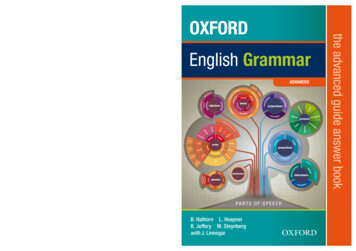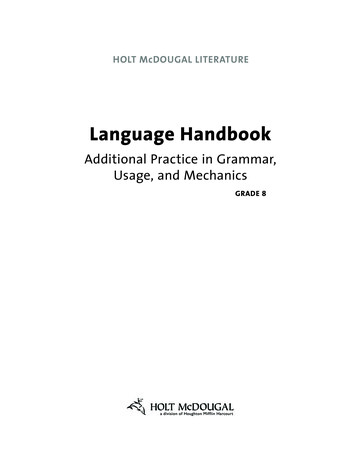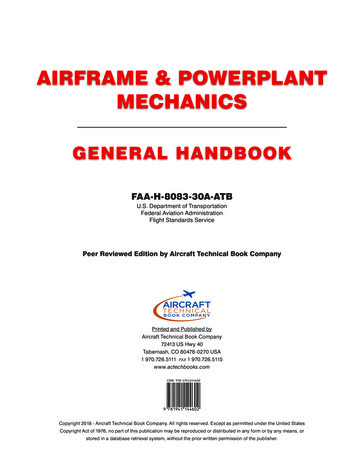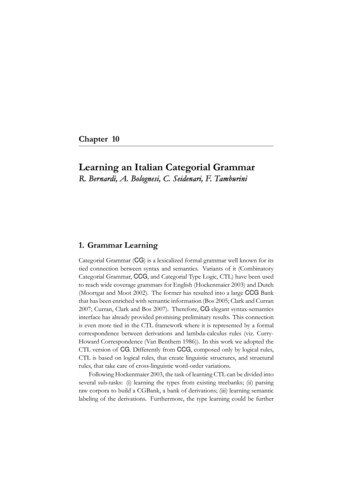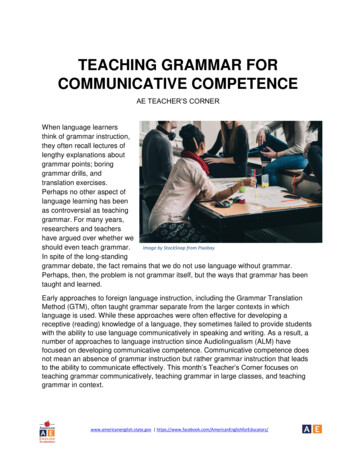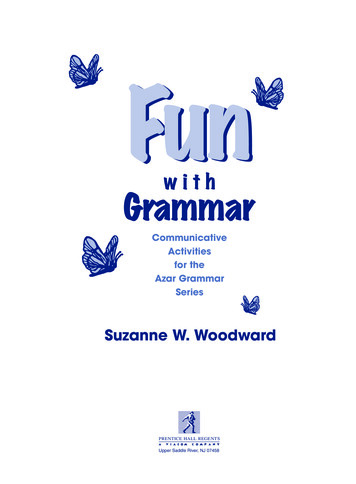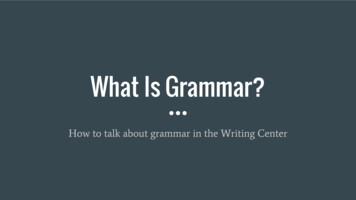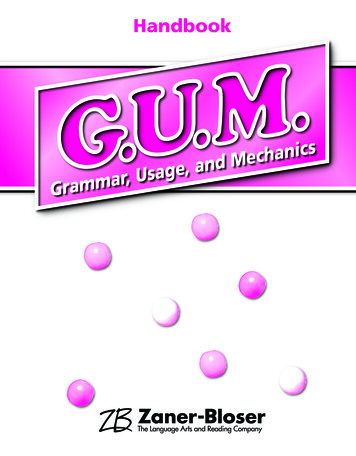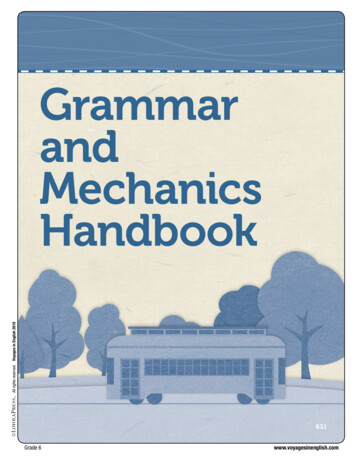
Transcription
All rights reserved. Voyages in English 2018GrammarandMechanicsHandbook 631Grade 6www.voyagesinenglish.com
GrammarGrammarAdjectivesAn adjective points out or describes a noun.That building is tall.Adjective PhrasesAn adjective phrase is a prepositional phrase that describes a nounor pronoun. See PHRASES.ArticlesAn article points out a noun. See ARTICLES.Common AdjectivesA common adjective expresses an ordinary quality of a noun orpronoun: fast car, delicious hamburger.Comparison of AdjectivesMost adjectives have three degrees of comparison: positive,comparative, and superlative.The positive degree of an adjective shows a quality of a nounor pronoun.Elephants are large animals.The actor is famous.Those rings are valuable.All rights reserved. Voyages in English 2018The comparative degree is used to compare two items or two setsof items. This form is often followed by than.Whales are larger than elephants.The dancer is more famous than the actor.The bracelets are less valuable than the rings.The superlative degree is used to compare three or more items orsets of items.Whales are the largest mammals.The singer is the most famous performer in the show.The necklaces are the least valuable of all the jewelry. Grammar and Mechanics Handbook 632Grade 6www.voyagesinenglish.com
GrammarThe adjectives few, fewer, and fewest are used to compare nouns thatcan be counted. Note that these nouns are plural in form.Kara made a few cookies for the bake sale.Joel made fewer cookies than Kara did.Keesha made the fewest cookies of anyone in class.The adjectives little, less, and least are used to compare nouns thatcannot be counted. Note that these nouns are singular in form.Kara has little time to bake cookies.Joel has less time than Kara.Keesha has the least time of us all.Demonstrative AdjectivesA demonstrative adjective points out a definite person, place, thing,or idea. Demonstrative adjectives always precede the nouns theymodify and agree with them in number.SingularPluralthis plantthat plantthese plantsthose plantsThis and these point out things or people that are near. That andthose point out things or people that are farther away.This plant is healthy. (singular and near)Those plants need water. (plural and far)Descriptive AdjectivesA descriptive adjective gives information about a noun or pronoun.It tells about age, size, shape, color, origin, or another quality.All rights reserved. Voyages in English 2018This African violet has small, pink, pointy petals.Indefinite AdjectivesAn indefinite adjective refers to all or any of a group of people,places, or things. Some of the most common indefinite adjectivesare all, another, any, both, each, either, every, few, many, most, neither,no, other, several, and some. Note that another, each, every, either,and neither are always singular and the others are plural.Every student has a pencil.Several students have rulers. 633 Grammar and Mechanics HandbookGrade 6www.voyagesinenglish.com
GrammarInterrogative AdjectivesAn interrogative adjective is used in asking a question. Theinterrogative adjectives are which, what, and whose.Which is used to ask about one or more of a specific set of people orthings. What is used to ask about people or things but is not limitedto a specific group or set. Whose asks about possession.Which backpack is yours?What supplies do you carry in your backpack?Whose backpack is under the chair?Numerical AdjectivesA numerical adjective indicates an exact number. Numericaladjectives may refer to a number of people or things, or they mayrefer to the arrangement of things in numerical order.My family has two cats.The first day of the week is Sunday.Position of AdjectivesMost adjectives go before the words they describe.Many dedicated gardeners live on my block.Adjectives may also directly follow nouns.Their flowers, tall and colorful, brighten every yard.An adjective can follow a linking verb as a subject complement.The results of their work are spectacular.Possessive AdjectivesAll rights reserved. Voyages in English 2018A possessive adjective shows possession or ownership. Possessiveadjectives have antecedents. A possessive adjective must agree withits antecedent in person, number, and gender.John has a skateboard. His skateboard is silver.Jo and Luis have bikes. Their bikes are new.Possessive adjectives change form depending on person andnumber. Third person singular possessive adjectives change formdepending on gender—whether they are masculine (his), feminine(her), or neuter (its). Grammar and Mechanics Handbook 634Grade 6www.voyagesinenglish.com
GrammarFirst PersonSecond PersonThird PersonSingularPluralmyyourhis, her, itsouryourtheirProper AdjectivesA proper adjective is formed from a proper noun: Roman ruins,Mexican food.Subject ComplementsAn adjective may be used as a subject complement. SeeSUBJECT COMPLEMENTS.AdverbsAn adverb modifies a verb, an adjective, or another adverb. Adverbsindicate time, place, manner, degree, affirmation, or negation.Adverbs of time answer the question when or how often.The chorus frequently sings for us.Adverbs of place answer the question where.The tenors walked forward.Adverbs of manner answer the question how.They begin to sing loudly.Adverbs of degree answer the question how much or how little.The sopranos had very clear voices.All rights reserved. Voyages in English 2018Adverbs of affirmation tell whether a statement is positive orexpresses consent or approval. Adverbs of negation expresssomething negative or a refusal.Yes, we enjoyed the concert.We never miss hearing them sing.Adverb ClausesAn adverb clause is a dependent clause used as an adverb.See CLAUSES. 635 Grammar and Mechanics HandbookGrade 6www.voyagesinenglish.com
GrammarAdverb PhrasesAn adverb phrase is a prepositional phrase used as an adverb.See PHRASES.Adverbial NounsAn adverbial noun is a noun that acts as an adverb. An adverbialnoun expresses time, distance, measure, weight, value, or direction.The trip will take only a few minutes. (time)The post office is just five blocks away. (distance)The box is a foot long. (measure)The package weighs six pounds. (weight)It’s worth 20 dollars. (value)Look this way. (direction)Comparison of AdverbsMost adverbs have three degrees of comparison: positive,comparative, and superlative.Tom works carefully.Eddie works more carefully than Tom.Luz works most carefully of anyone in class.Wiley ate rapidly.Frank ate less rapidly than Wiley.Allison ate least rapidly of anyone.Carla walks fast.Lisa walks faster than Carla.Ping walks fastest of us all.Relative AdverbsAll rights reserved. Voyages in English 2018The relative adverbs are where, when, and why. When and whereare used at the beginning of an adjective clause to modify a timeor a place.The house where my father grew up is being torn down.Why is used at the beginning of an adjective clause to explain thereason for something.Tell me why your project will be late. Grammar and Mechanics Handbook 636Grade 6www.voyagesinenglish.com
GrammarAntecedentsThe noun to which a pronoun or a possessive adjective refers isits antecedent. A pronoun or possessive adjective must agreewith its antecedent in person and number. Third-person singularpersonal, possessive, intensive, and reflexive pronouns andpossessive adjectives must also agree in gender. See GENDER,NUMBER, PERSON.AppositivesAn appositive is a word (or words) that follows a noun and helpsidentify it or adds more information about it. An appositive namesthe same person, place, thing, or idea as the noun it explains. Anappositive phrase is an appositive and its modifiers.An appositive is restrictive if it is necessary to understand thesentence. It is nonrestrictive if it is not necessary. A nonrestrictiveappositive is set off by commas.The poet Langston Hughes also wrote stories and plays.Toni Morrison, the American writer, won the Nobel Prize.ArticlesAn article points out a noun. The is the definite article. It refers toa specific item or specific items in a group. The may be used witheither singular or plural concrete nouns and with abstract nouns.All rights reserved. Voyages in English 2018We went to the beach yesterday.The beaches in California are beautiful.The sand is very white.A and an are the indefinite articles. Each is used to refer to a singlemember of a general group. A and an are used only with singularconcrete nouns. The article an is used before a vowel sound. Thearticle a is used before a consonant sound.We sat on a blanket under an umbrella. 637 Grammar and Mechanics HandbookGrade 6www.voyagesinenglish.com
GrammarClausesA clause is a group of words that has a subject and a predicate.Adverb ClausesAn adverb clause is a dependent clause used as an adverb. Anadverb clause can tell how, when, where, why, and to what extent.We locked all the doors before we left.We went where we could see the beach.We didn’t tell anyone because it was a secret.Dependent ClausesA dependent clause cannot stand on its own as a sentence.While we were loading the car, my cell phone rang.Independent ClausesAn independent clause can stand on its own as a sentence.We drove off after I answered the phone.ConjunctionsA conjunction is a word used to connect words, phrases, or clausesin a sentence.Coordinating ConjunctionsA coordinating conjunction is used to connect similar words orgroups of words. The coordinating conjunctions are and, but, or,nor, and yet.All rights reserved. Voyages in English 2018My cousin is a swimmer and a sailor. (nouns)She is quick but methodical. (adjectives)She doesn’t go hiking or camping. (verbs)She owns neither hiking boots nor a sleeping bag. (nouns)She is known for her kindness and for her sense of humor.(prepositional phrases) Grammar and Mechanics Handbook 638Grade 6www.voyagesinenglish.com
GrammarCoordinating conjunctions can connect independent ordependent clauses.She spends a lot of time alone, yet she has many friends.(independent clauses)She is popular because she is kind and because she has a goodsense of humor. (dependent clauses)Correlative ConjunctionsCorrelative conjunctions travel in pairs and emphasize therelationship between words or groups of words of equal importance.The pairs both, and; either, or; neither, nor; and not only, but also arecorrelative conjunctions.Tara used both an encyclopedia and an online article in her report.The award will go to either the fourth-grade or fifth-grade class.I have neither the time nor the interest in seeing that movie.Martin was not only honored but also humbled by thecitizenship award.Subordinate ConjunctionsA subordinate conjunction is used to join a dependent clause andan independent clause. Some common subordinate conjunctionsare although, after, as, because, before, if, in order that, provided that,since, so that, unless, until, when, whenever, where, wherever, whether,and while.She is popular because she has a good sense of humor.After she moved away, I e-mailed her every week.Direct ObjectsAll rights reserved. Voyages in English 2018The direct object of a sentence answers the question whom or whatafter the verb. A noun or an object pronoun can be used as adirect object.My mom made lemonade.I helped her. 639 Grammar and Mechanics HandbookGrade 6www.voyagesinenglish.com
GrammarGenderThird-person singular personal, possessive, intensive, and reflexivepronouns and possessive adjectives change form depending ongender—whether the antecedent is masculine (he, him, his, himself),feminine (she, her, hers, herself), or neuter (it, its, itself).Indirect ObjectsAn indirect object tells to whom or for whom, or to what or for what,an action is done. A noun or an object pronoun can be used as anindirect object.I gave my dad a birthday present.I made him a birthday card.InterjectionsAn interjection is a word or phrase that expresses a strong orsudden emotion, such as happiness, disgust, pain, agreement,impatience, surprise, sadness, and amazement.Ouch! I stubbed my toe.Oh, no! I lost my keys.Hurray! I won the contest.Wow! Your new bike is awesome.MoodAll rights reserved. Voyages in English 2018Mood shows the manner in which the action or state of being of averb is expressed.Emphatic MoodThe emphatic mood gives special force to a simple present- or pasttense verb. To make a verb emphatic, use do, does, or did before thebase form of the verb.I do like to play baseball.He did hit a home run last night. Grammar and Mechanics Handbook 640Grade 6www.voyagesinenglish.com
GrammarImperative MoodThe imperative mood is used to express a command or arequest. The imperative mood uses the base form of a verb. Thesubject of an imperative sentence is usually understood to bethe second-person pronoun, you.Catch the ball!Please hand me that bat.A command can be given in the first person by using let’s before thebase form of a verb.Let’s play another game tomorrow.Indicative MoodThe indicative mood is used to make a statement or ask a question.Most sentences are in the indicative mood.Do you like to play baseball?I learned to play last year.Baseball is my favorite game.Subjunctive MoodThe subjunctive mood is used to express a wish or desire; toexpress a command, request, or suggestion following the wordthat; or to express something that is contrary to fact (not true).The subjunctive mood refers to what is hoped or wished ratherthan what actually is.For the verb be, the subjunctive forms are be and were. Be iscommonly used with verbs of command, request, or suggestion.Otherwise, were is typically used. The auxiliary would is used inplace of will.All rights reserved. Voyages in English 2018I wish I were a better player. (a wish)The coach requested that we be here on time. (a request after that)If I were you, I would arrive at noon. (something that is contrary to fact)NounsA noun is a name word. A singular noun names one person, place,thing or idea: boy, city, book, time. A plural noun names more thanone person, place, or thing: boys, cities, books, times. 641 Grammar and Mechanics HandbookGrade 6www.voyagesinenglish.com
GrammarAbstract NounsAn abstract noun names something that you cannot observe withyour senses. It refers to an emotion, a state of being, or a belief.Love, freedom, and compassion are examples of abstract nouns.AppositivesAn appositive is a word (or words) that follows a noun and helpsidentify it or adds more information about it. See APPOSITIVES.Collective NounsA collective noun names a group of people, animals, or thingsconsidered as one: team, herd, bunch.Common NounsA common noun names any one member of a class of people, places,or things: sailor, town, telephone.Concrete NounsA concrete noun names something that you can observe with yoursenses. Book, cat, and couch are examples of concrete nouns.Count NounsA count noun names something that can be counted: bench, cactus,ball, idea, wish. Count nouns can be made plural because they canbe counted.Noncount NounsAll rights reserved. Voyages in English 2018A noncount noun names something that generally cannot becounted and does not have a plural form: money, milk, rain, time,happiness.Nouns in Direct AddressA noun in direct address names the person spoken to. A noun usedin direct address is set off from the rest of the sentence by a commaor commas.Peter, are you coming with us?Bring your skateboard, Carly, and wear your helmet. Grammar and Mechanics Handbook 642Grade 6www.voyagesinenglish.com
GrammarPossessive NounsA possessive noun expresses possession or ownership.To form the singular possessive, add -’s to the singular formof the noun.friendscientistfriend’s reportscientist’s excavationTo form the possessive of a plural noun ending in s, add anapostrophe only.kingsarchaeologistskings’ treasurearchaeologists’ workTo form the possessive of a plural noun that does not end in s,add -’s.womenwomen’s influenceThe possessive of a proper noun ending in s is usually formed byadding -’s.JamesJames’s researchThe possessive of a compound noun is formed by adding -’s to theend of the word.brother-in-law’s vacationbrothers-in-law’s vacationsSeparate possession occurs when two or more people own thingsindependently of one another. To show separate possession, use -’safter each noun.All rights reserved. Voyages in English 2018Ann and Peter each own a boat.Ann’s and Peter’s boats are in the marina.Joint possession occurs when two or more people own somethingtogether. To show joint possession, use -’s after the last noun only.Tom and Gloria are the owners of three boats.Tom and Gloria’s boats are all painted bright blue.Proper NounsA proper noun names a particular person, place, or thing: GeorgeWashington, White House, Continental Congress. 643 Grammar and Mechanics HandbookGrade 6www.voyagesinenglish.com
GrammarNumberThe number of a noun or pronoun indicates whether it refers to oneperson, place, thing, or idea (singular) or more than one person,place, thing, or idea (plural).PersonPersonal, possessive, intensive, and reflexive pronouns andpossessive adjectives change form according to person—whetherthe antecedent is the person speaking (first person), being spoken to(second person), or being spoken about (third person).PhrasesA phrase is a group of words that is used as a single part of speech.Adjective PhrasesAn adjective phrase is a phrase used as an adjective.The clown with the red hair was twisting balloons.Adverb PhrasesAn adverb phrase is a prepositional phrase used as an adverb.She threw the balloons into the air.Verb PhrasesAll rights reserved. Voyages in English 2018A verb phrase is a group of words that does the work of a single verb.A verb phrase contains a main verb and one or more helping verbssuch as is, are, have, can, and do.They are studying.They will be studying until dinnertime.In some questions and statements, the parts of a verb phrase maybe separated.Did they finish their projects?Dolores has not finished hers. Grammar and Mechanics Handbook 644Grade 6www.voyagesinenglish.com
GrammarPredicatesThe predicate of a sentence names an action or a state of being.Complete PredicatesThe complete predicate of a sentence is the verb or verb phrasealong with its modifiers and complements or objects.The boy carried his books slowly down the street.Compound PredicatesTwo or more predicates joined by a coordinating conjunction forma compound predicate.He stopped and waited for his friends.Simple PredicatesThe simple predicate of a sentence is the verb or verb phrase.His friends were racing their bikes on Main Street.PrepositionsA preposition is a word that shows the relationship of a noun or apronoun to another word in a sentence.Adjective PhrasesA prepositional phrase can be used as an adjective.The woman in the red dress is my mother.Adverb PhrasesAll rights reserved. Voyages in English 2018A prepositional phrase can be used as an adverb.She is walking across the street.Objects of PrepositionsThe noun or pronoun that follows a preposition is the object of thatpreposition.Did you jump over the log or walk around it? 645 Grammar and Mechanics HandbookGrade 6www.voyagesinenglish.com
GrammarPrepositional PhrasesA prepositional phrase is a preposition, its object, and any wordsthat describe the object.We walked through the dark, silent woods.PronounsA pronoun is a word used in place of a noun. The noun to whicha pronoun refers is its antecedent. A pronoun must agree withits antecedent in person and number. Third-person personal,possessive, intensive, and reflexive pronouns must also agree ingender. See GENDER, NUMBER, PERSON.Demonstrative PronounsA demonstrative pronoun points out a particular person, place,or thing.SingularPluralthisthatthesethoseThis and these point out things or people that are near. That andthose point out things or people that are farther away.This is my favorite sweater. (singular and near)Those are my old ski boots. (plural and far)Indefinite PronounsAll rights reserved. Voyages in English 2018An indefinite pronoun refers to any or all of a group of people,places, or things. Some indefinite pronouns are anybody, many, both,none, few, and everyone.Most indefinite pronouns are singular. The indefinite pronounsboth, few, many, and several are always plural.Everyone in the class is invited to the party.Few of the students are going to miss it.The indefinite pronouns all, some, and none may be singular orplural, depending on whether the noun they refer to is singularor plural.All of the children are here. Grammar and Mechanics Handbook 646All of the class is here.Grade 6www.voyagesinenglish.com
GrammarIndefinite pronouns such as no one, nobody, none, and nothing arenegative words. In a sentence they should never be used with othernegative words, such as no, not, and never.Intensive PronounsIntensive pronouns end in self or selves. An intensive pronounemphasizes a preceding noun or pronoun. It must agree with itsantecedent in person, number, and gender.She made the whole dinner herself.I myself have never cooked an entire meal.Intensive pronouns change form depending on person and number.Third-person singular intensive pronouns change form dependingon gender—whether the antecedent is masculine (himself), feminine(herself), or neuter (itself).First PersonSecond PersonThird selfourselvesyourselvesthemselvesInterrogative PronounsAn interrogative pronoun is used to ask a question. Theinterrogative pronouns are who, whom, whose, what, and which.Who refers to people. It is often the subject of a question. Whom alsorefers to people. It is the object of a verb or a preposition.All rights reserved. Voyages in English 2018Who is starring in the play?Whom did you see at rehearsal?To whom did they sell the tickets?Whose is used to ask about possession. Which is used when askingabout a group or class. What is used for asking about things or forseeking information.Whose is the script on the chair?Which of the actors missed his entrance?What did he leave on stage?What did the director tell him? 647 Grammar and Mechanics HandbookGrade 6www.voyagesinenglish.com
GrammarObject PronounsAn object pronoun can be used as the direct object or the indirectobject of a verb or as the object of a preposition. The objectpronouns are me, you, him, her, it, us, and them.Carla met him at the party. (direct object)Tom gave her a present. (indirect object)The house was decorated by them. (object of a preposition)Personal PronounsPersonal pronouns change form depending on person and number.Third-person singular pronouns change form to reflect gender—whether the antecedent is feminine (she, her), masculine (he, him),or neuter (it).First PersonSecond PersonThird PersonSingularPluralI, meyouhe, she, it, him, herwe, usyouthey, themPersonal pronouns also change form depending on whether they areused as subjects (I, you, he, she, it, we, they) or objects (me, you, him,her, it, us, them).Possessive PronounsA possessive pronoun shows possession or ownership. It takes theplace of a possessive noun. Possessive pronouns must agree withtheir antecedents in person, number, and gender.Maria and Tom have pets.Hers is a cat, and his is a hamster.All rights reserved. Voyages in English 2018Possessive pronouns change form depending on person and number.Third-person singular possessive pronouns change form to reflectgender—whether the antecedent is masculine (his), feminine (hers),or neuter (its).First PersonSecond PersonThird Person Pluralmineyourshis, hers, itsoursyourstheirsGrammar and Mechanics Handbook 648SingularGrade 6www.voyagesinenglish.com
GrammarReflexive PronounsReflexive pronouns end in self or selves. A reflexive pronoun can bethe direct or indirect object of a verb or the object of a preposition.It generally refers to the subject of the sentence. Reflexive pronounsmust agree with their antecedents in person, number, and gender.I consider myself a good reader. (direct object)He bought himself a new book. (indirect object)They read it by themselves. (object of a preposition)Reflexive pronouns change form depending on person and number.Third-person singular reflexive pronouns change form dependingon gender—whether the antecedent is masculine (himself), feminine(herself), or neuter (itself).First PersonSecond PersonThird selfourselvesyourselvesthemselvesRelative PronounsA relative pronoun connects an adjective clause to the noun itmodifies. Relative pronouns can serve as subjects, direct objects,indirect objects, or objects of prepositions. The relative pronounsare who, whom, whose, which, and that.Who and whom refer to people. Who is used as the subject of anadjective clause. Whom is used as the object of an adjective clause.All rights reserved. Voyages in English 2018My grandfather, who served in World War II, was selected to be thegrand marshal of the Memorial Day parade.My grandfather, whom the mayor awarded the key to the city, wasproud to receive this honor.Which refers to animals, places, or things. That refers to people,animals, places, or things. Whose often refers to people but can alsorefer to animals, places, or things.The movie, which is based on a true story, is a big hit.This is the movie that everyone is talking about.I saw the movie with my friend, whose knowledge of movies is amazing. 649 Grammar and Mechanics HandbookGrade 6www.voyagesinenglish.com
GrammarSubject PronounsA subject pronoun can be used as the subject of a sentence or as asubject complement. The subject pronouns are I, you, he, she, it, we,and they.She painted that picture. (subject)The subject of the portrait is he. (subject complement)SentencesA sentence expresses a complete thought. The essential parts of asentence are a subject and a predicate.Complex SentencesA complex sentence contains an independent clause and one ormore dependent clauses.As soon as Marta arrives, we will leave for the movie.Compound SentencesA compound sentence contains two or more independent clauses.Independent clauses in a compound sentence are usually connectedby a coordinating conjunction. A semicolon may be used instead ofa coordinating conjunction.Marta will be here soon, and then we’ll leave.Tom is going to drive; he has the biggest car.Declarative SentencesA declarative sentence makes a statement. It ends with a period.All rights reserved. Voyages in English 2018Elephants are the largest land mammals.Exclamatory SentencesAn exclamatory sentence expresses a strong emotion. It ends withan exclamation point.That elephant is huge!Imperative SentencesAn imperative sentence gives a command. It ends with a period.Find out how much that elephant weighs. Grammar and Mechanics Handbook 650Grade 6www.voyagesinenglish.com
GrammarInterrogative SentencesAn interrogative sentence asks a question. It ends with aquestion mark.Did you ask the keeper what the elephant weighs?Inverted Order in SentencesA sentence is in inverted order when the main verb or an auxiliaryverb comes before the subject.Across the exhibit walked the baby elephant.Have you seen the new elephant at the zoo?There are now three elephants in our zoo.Here is my DVD of Dumbo.Natural Order in SentencesA sentence is in natural order when the verb follows the subject.The baby elephant walked toward its mother.Simple SentencesA simple sentence contains a subject and a predicate and expressesa complete thought. Either or both may be compound.The baby and its mother watched the keeper.Subject ComplementsAll rights reserved. Voyages in English 2018A subject complement follows a linking verb such as the forms ofbe. A noun or pronoun used as a subject complement renames thesubject of the sentence; it refers to the same person, place, thing,or idea. An adjective used as a subject complement describes thesubject of the sentence.My sister is a doctor.The winner of that award was she.Her job can be very rewarding. 651 Grammar and Mechanics HandbookGrade 6www.voyagesinenglish.com
GrammarSubjectsThe subject of a sentence names the person, place, or thing thesentence is about. To determine the subject of a sentence, ask whoor what before the verb.Complete SubjectsThe complete subject of a sentence is the simple subject and all thewords that describe it.The small, shaggy dog barked loudly.Compound SubjectsTwo or more subjects joined by a coordinating conjunction form acompound subject.The dog and its owner walked through the park.Simple SubjectsThe simple subject of a sentence is the noun or pronoun that namesthe person, place, or thing the sentence is about.The small dog with the red collar is mine.TensesThe tense of a verb expresses the time of the action or state of being.Perfect TensesAll rights reserved. Voyages in English 2018The present perfect tense tells about an action that happened atsome indefinite time in the past or an action that started in thepast and continues into the present. It uses have or has and thepast participle.I have finished all my homework.She has lived in that house for a year.The past perfect tense tells about a past action that was completedbefore another past action started. It uses had and the pastparticiple.I had finished my homework before my dad got home. Grammar and Mechanics Handbook 652Grade 6www.voyagesinenglish.com
GrammarProgressive TensesThe present progressive tense tells about something that ishappening right now. It uses the present tense of the verb be (am,is, are) and the present participle.The students are working on a science project.The past progressive tense tells about something that washappening in the past. It uses the past tense of the verb be (was,were) and the present participle.They were doing math an hour ago.The future progressive tense tells about something that will behappening in the future. It uses will or is/are going to with be and thepresent participle.They will be rehearsing their presentation tomorrow night.They are going to be presenting their project
The adjectives few, fewer, and fewest are used to compare nouns that can be counted. Note that these nouns are plural in form. Kara made a few cookies for the bake sale. Joel made fewer cookies than Kara did. Keesha made the fewest cookies of anyone in class. The adjectives little, less, an
